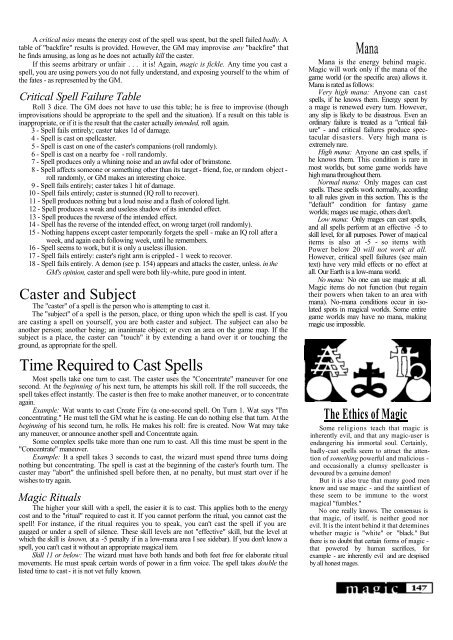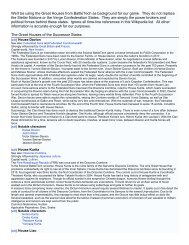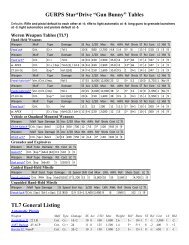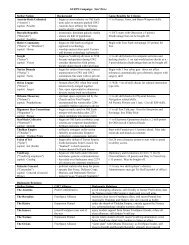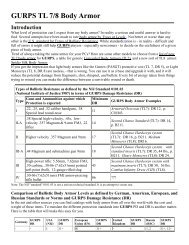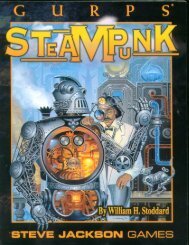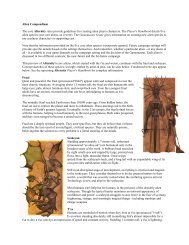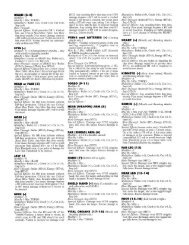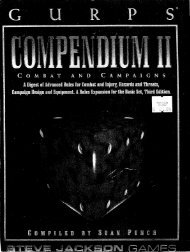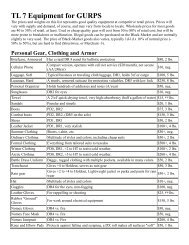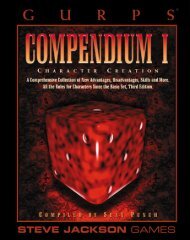A critical miss means the energy cost of the spell was spent, but the spell failed badly. Atable of "backfire" results is provided. However, the GM may improvise any "backfire" thathe finds amusing, as long as he does not actually kill the caster.If this seems arbitrary or unfair . .. it is! Again, magic is fickle. Any time you cast aspell, you are using powers you do not fully understand, and exposing yourself to the whim ofthe fates - as represented by the GM.Critical Spell Failure TableRoll 3 dice. The GM does not have to use this table; he is free to improvise (thoughimprovisations should be appropriate to the spell and the situation). If a result on this table isinappropriate, or if it is the result that the caster actually intended, roll again.3 - Spell fails entirely; caster takes 1d of damage.4 - Spell is cast on spellcaster.5 - Spell is cast on one of the caster's companions (roll randomly).6 - Spell is cast on a nearby foe - roll randomly.7 - Spell produces only a whining noise and an awful odor of brimstone.8 - Spell affects someone or something other than its target - friend, foe, or random object -roll randomly, or GM makes an interesting choice.9 - Spell fails entirely; caster takes 1 hit of damage.10 - Spell fails entirely; caster is stunned (IQ roll to recover).11 - Spell produces nothing but a loud noise and a flash of colored light.12 - Spell produces a weak and useless shadow of its intended effect.13 - Spell produces the reverse of the intended effect.14 - Spell has the reverse of the intended effect, on wrong target (roll randomly).15 - Nothing happens except caster temporarily forgets the spell - make an IQ roll after aweek, and again each following week, until he remembers.16 - Spell seems to work, but it is only a useless illusion.17 - Spell fails entirely: caster's right arm is crippled - 1 week to recover.18 - Spell fails entirely. A demon (see p. 154) appears and attacks the caster, unless. in theGM's opinion, caster and spell were both lily-white, pure good in intent.Caster and SubjectThe "caster" of a spell is the person who is attempting to cast it.The "subject" of a spell is the person, place, or thing upon which the spell is cast. If youare casting a spell on yourself, you are both caster and subject. The subject can also beanother person; another being; an inanimate object; or even an area on the game map. If thesubject is a place, the caster can "touch" it by extending a hand over it or touching theground, as appropriate for the spell.Time Required to Cast SpellsMost spells take one turn to cast. The caster uses the "Concentrate" maneuver for onesecond. At the beginning of his next turn, he attempts his skill roll. If the roll succeeds, thespell takes effect instantly. The caster is then free to make another maneuver, or to concentrateagain.Example: Wat wants to cast Create Fire (a one-second spell. On Turn 1. Wat says "I'mconcentrating." He must tell the GM what he is casting. He can do nothing else that turn. At thebeginning of his second turn, he rolls. He makes his roll: fire is created. Now Wat may takeany maneuver, or announce another spell and Concentrate again.Some complex spells take more than one rum to cast. All this time must be spent in the"Concentrate" maneuver.Example: It a spell takes 3 seconds to cast, the wizard must spend three turns doingnothing but concentrating. The spell is cast at the beginning of the caster's fourth turn. Thecaster may "abort" the unfinished spell before then, at no penalty, but must start over if hewishes to try again.Magic RitualsThe higher your skill with a spell, the easier it is to cast. This applies both to the energycost and to the "ritual" required to cast it. If you cannot perform the ritual, you cannot cast thespell! For instance, if the ritual requires you to speak, you can't cast the spell if you aregagged or under a spell of silence. These skill levels are not "effective" skill, but the level atwhich the skill is known, at a -5 penalty if in a low-mana area I see sidebar). If you don't know aspell, you can't cast it without an appropriate magical item.Skill 11 or below: The wizard must have both hands and both feet free for elaborate ritualmovements. He must speak certain words of power in a firm voice. The spell takes double thelisted time to cast - it is not vet fully known.ManaMana is the energy behind magic.Magic will work only if the mana of thegame world (or the specific area) allows it.Mana is rated as follows:Very high mana: Anyone can castspells, if he knows them. Energy spent bya mage is renewed every turn. However,any slip is likely to be disastrous. Even anordinary failure is treated as a "critical failure"- and critical failures produce spectaculardisasters. Very high mana isextremely rare.High mana: Anyone can cast spells, ifhe knows them. This condition is rare inmost worlds, but some game worlds havehigh mana throughout them.Normal mana: Only mages can castspells. These spells work normally, accordingto all rules given in this section. This is the"default" condition for fantasy gameworlds; mages use magic, others don't.Low mana: Only mages can cast spells,and all spells perform at an effective -5 toskill level, for all purposes. Power of magicalitems is also at -5 - so items withPower below 20 will not work at all.However, critical spell failures (see maintext) have very mild effects or no effect atall. Our Earth is a low-mana world.No mana: No one can use magic at all.Magic items do not function (but regaintheir powers when taken to an area withmana). No-mana conditions occur in isolatedspots in magical worlds. Some entiregame worlds may have no mana, makingmagic use impossible.The Ethics of MagicSome religions teach that magic isinherently evil, and that any magic-user isendangering his immortal soul. Certainly,badly-cast spells seem to attract the attentionof something powerful and malicious -and occasionally a clumsy spellcaster isdevoured by a genuine demon!But it is also true that many good menknow and use magic - and the saintliest ofthese seem to be immune to the worstmagical "fumbles."No one really knows. The consensus isthat magic, of itself, is neither good norevil. It is the intent behind it that determineswhether magic is "white" or "black." Butthere is no doubt that certain forms of magic -that powered by human sacrifices, forexample - are inherently evil and are despisedby all honest mages.
Magical Termsabort: To stop the casting of a spell beforeits completion.backfire: A critical miss when a spell iscast. Same as "fumble."base skill: A level of spell skill given byspending 1 character point (the minimum)for an ordinary (Mental/Hard)spell, or 2 points for a M/VH spell.basic spell: A spell with no other spells asprerequisites.cancel: To end your own spell before itwould normally be over.caster: The person casting a spell.effective skill: Your true skill, plus orminus any bonuses or penalties (usuallypenalties) for range, circumstances, etc.A caster rolls against effective skill.energy: The "cost" to cast a spell. Energycost may be paid in either ST points(fatigue) or HT points (hits). Lost energyof either kind is recovered as usual:resting for fatigue, healing for hits.grimoire: A book of spells. Specifically,the list of spells available to a particularcharacter, and their cost.mage: Anyone with the advantage ofMagical Aptitude.magery or Magical Aptitude: Two wordsfor the same thing. Magery is theadvantage of being "in tune" with thepowers of magic; see p. 21.maintain: To continue a spell after itwould normally end. Costs more energy,unless the caster has high skill.mana: The energy of magic. Differentareas (or worlds) have different levelsof mana. See sidebar, p. 147.mastered spell: A spell known at a highenough skill to eliminate the need toconcentrate to cast it.missile spell: A spell which is first cast,and then "thrown" at the subject.Requires two rolls: a skill roll to cast, aThrowing or Spell Throwing roll to hit.prerequisite: A requirement for learning aspell.resisted: Any spell that has to overcomethe "power" of its subject before itworks.subject: The person, place or thing onwhich a spell is cast.wizard: Any user of magic, whether he is amage or not.Skill 12-14: The wizard must speak a few quiet words and make a gesture to activate thespell. At this level (and above) spells take the listed time to complete.Skill 15-17: The wizard must speak a word or two and gesture - a couple of fingers areenough. He is allowed to move one hex per turn while taking the Concentrate maneuver. At level15, the spell's energy cost is reduced by 1.Skill 18-20: The wizard must speak a word or two or make a small gesture, but not necessarilyboth. At level 20, the spell's energy cost is reduced by 2.Skill 21-24: No ritual is needed. The wizard simply seems to stare into space as he concentrates.Casting time is halved (round up). A spell that would normally take one second cannow be cast without a turn of concentration, even while taking another maneuver - fighting,talking, etc. You may never cast two spells at once!Skill 25 or over: As above, but casting time is now 1/4 normal, rounded up. At level 25, thespell's energy cost is reduced by 3. Each further 5 levels of skill will halve casting time again andreduce cost by 1 more.Some spells always require a certain ritual or item; this is noted in the spell lists, andoverrides the general rules. Note that time to cast missile spells is not reduced by skill.Distraction and InjuryIf the caster is hurt, knocked down, forced to use an active defense, or otherwise dis tractedwhile concentrating, he must make a (Will-3) roll to maintain his casting. A failed roll means hemust start over. If he is injured while concentrating, his effective skill for that spell is lowered bythe number of hits he suffered.Energy Cost for Casting SpellsEach spell has an energy cost. When you cast a spell, it costs you energy - either HT or ST.The better you know a spell, the less energy is required to cast it. If you know it well enough, youcan cast it at no cost. The mana level of the area (see sidebar, p. 147) affects a wizard's effectiveskill with spells. Low mana also prevents use of the Recover Strength spell (p. 162), reducing thefrequency with which any spells can be cast.If your basic skill with a spell (modified by mana level) is 15+, the cost to cast that spell isreduced by 1. If your skill is 20+, the cost to cast it is reduced by 2 - and so on. The energy-is stillgoing into the spell - but your skill lets you draw it from the surrounding mana rather thansupplying it yourself! Thus (for instance) at skill 20, in a normal-mana area, you can cast a 2-diefireball (requiring 2 energy points) at no energy cost. To make it a 3-die fireball, you would haveto add 1 point of your own energy.The entire cost for a spell is calculated before any subtraction for high skill. A mage whocan create small fires repeatedly, at no cost, might still be exhausted by creating a single multihexfire. High skill also lowers the cost to maintain a spell - see below.Normally, the energy cost from a spell is considered "fatigue" - see p. 134. Lost fatigue canbe recovered by rest. A mage who knows the Recover Strength spell (see p. 162) can regain lostST faster than normal. A caster may take energy from his body's vital force instead of just hisStrength. He marks off some or all of the spell's cost against HT rather than ST. In other words,the spell is doing actual harm to the caster! This is dangerous, but may be necessary if the casteris badly fatigued and has to throw another spell. HT lost this way is treated just like any otherinjury.A wizard's skill is at -1 for every point of HT he used to cast that spell.A wizard may "burn" HT until he falls unconscious. Should a failed HT roll indicate he hasdied, the HT for that particular casting wasn't actually spent, and he falls unconscious instead ofdying, thus ending the HT drain.Duration of Spells and Maintaining SpellsSome spells take effect instantly and cannot be maintained. Other spells last for a given time(see the Spell List) and then wear off - unless they are maintained.If a spell can be maintained, it will continue for a time equal to its original duration. A spellmay be maintained as often as the caster wants, if he keeps paying the energy cost. He cannotmaintain a spell while he sleeps! But only the caster can maintain a spell. No new skill roll isrequired.However, further energy must be spent. If a spell can be maintained, the cost is in the SpellList. Example: The Light spell has a 1-minute duration, and a maintenance cost of 1 per minute.So the spell ends after a minute - unless, at the end of that minute, the caster spends one moreenergy point to maintain it. If a caster is conscious, he will know when one of his spells needs tobe renewed. Distance is not a factor in maintaining a spell.Concentration. Most spells can be maintained without "concentration" on the part of thecaster. But any spell that requires constant manipulation and change - e.g., control of a livingbeing - naturally requires constant concentration by the caster. This requires the caster to takeonly the "Concentrate" maneuver. If he is distracted, a Will-3 roll is required each turn. A failed
- Page 3 and 4:
17. FLIGHT.........................
- Page 5 and 6:
Materials Needed for PlayThe GURPS
- Page 7 and 8:
WHAT IS ROLEPLAYING?A roleplaying g
- Page 9 and 10:
Character TypesThere are no "charac
- Page 12 and 13:
Four numbers called "attributes" ar
- Page 14 and 15:
You are free to set the physical ap
- Page 16 and 17:
REPUTATIONSome characters are so we
- Page 18 and 19:
These are character traits that are
- Page 20 and 21:
Legal Enforcement Powers 5, 10 or 1
- Page 22 and 23:
Rapid Healing5 pointsThis advantage
- Page 24 and 25:
A minor deity as Patron to a travel
- Page 26 and 27:
ReputationVariable (see p. 17)Socia
- Page 28 and 29:
Lame-15,-25, or -35 pointsYou have
- Page 30 and 31:
Bad Temper-10 pointsYou are not in
- Page 32 and 33:
Dyslexia-5 or -15 pointsYou have a
- Page 34 and 35:
Pacifism-15 or -30 pointsYou are op
- Page 36 and 37:
Shyness-5,-10,-15 pointsYou are unc
- Page 38 and 39:
You have a significant responsibili
- Page 40 and 41:
A "quirk" is a minor personality tr
- Page 42 and 43:
SpecializingRequired Specialization
- Page 44 and 45:
MEANING OF SKILL LEVELSSo you have
- Page 46 and 47:
Teamster (Mental/Average)Defaults t
- Page 48 and 49:
Skiing (Physical/Hard)Defaults to D
- Page 50 and 51:
Guns/TL (Physical/Easy)Defaults to
- Page 52 and 53:
Any of these skills can be self-tau
- Page 54 and 55:
Levels of Language SkillThis table
- Page 56 and 57:
Most outdoor skills can be learned
- Page 58 and 59:
PSIONIC SKILLSThese are special men
- Page 60 and 61:
Forensics/TL (Mental/Hard)Defaults
- Page 62 and 63:
Few Hundred Acres: Knowledge of far
- Page 64 and 65:
Many skills in this category are ta
- Page 66 and 67:
Lockpicking/TL (Mental/Average) Def
- Page 68 and 69:
Gunner/TL See Combat Skills, p. 50M
- Page 70 and 71:
Now you need to decide what equipme
- Page 72 and 73:
Each suit of "real" armor includes
- Page 74 and 75:
Listing Weapons On Your Character S
- Page 76 and 77:
Recording Encumbrance on YourCharac
- Page 78 and 79:
Passive Defense. The first blank is
- Page 80 and 81:
The longer (and the more skillfully
- Page 82 and 83:
When you improve a skill, the cost
- Page 84 and 85:
Not all the advantages and disadvan
- Page 86 and 87:
But remember . . . some skills have
- Page 88 and 89:
ClimbingTo climb anything more diff
- Page 90 and 91:
SwimmingThe Swimming skill (p. 49)
- Page 92 and 93:
WILL ROLLSWhen a character is faced
- Page 94 and 95:
The GURPS combat system is designed
- Page 96 and 97: WaitDo nothing unless a foe comes w
- Page 98 and 99: You may only block one attack per t
- Page 100 and 101: Missile WeaponsMissile weapons are
- Page 102 and 103: At the end of your move, if you hav
- Page 104 and 105: The rules for attacking a foe are e
- Page 106 and 107: tell you how long it will take. In
- Page 108 and 109: You may normally parry only one att
- Page 110 and 111: CLOSE COMBATUsing the Move, Step an
- Page 112 and 113: (adjusted) ST! Note that a shield h
- Page 114 and 115: Ranged Weapon StatsFor each ranged
- Page 116 and 117: second. On the table, this rounds u
- Page 118 and 119: If you are using the "hit location"
- Page 120 and 121: Removing or folding the stock of a
- Page 122 and 123: After the initial "freeze" ends, ea
- Page 124 and 125: ATTACKING INANIMATE OBJECTSThere ar
- Page 126 and 127: This subtraction will mostoften aff
- Page 128 and 129: Psionic healing (p. 175) and magica
- Page 130 and 131: DrowningSee the rules for Swimming,
- Page 132 and 133: protects completely. Toughness prot
- Page 134 and 135: Resolving mounted or vehicular comb
- Page 136 and 137: Using Ranged Weapons From Horseback
- Page 138 and 139: This section covers special rules f
- Page 140 and 141: HT: Health and Hit PointsFor a roug
- Page 142 and 143: Swarm AttacksA group of small creat
- Page 144 and 145: Encumbrance and MovementEncumbrance
- Page 148 and 149: oll will not end the spell, but the
- Page 150 and 151: If the subject makes the resistance
- Page 152 and 153: won't work. If anyone but the caste
- Page 154 and 155: ANIMAL SPELLSThese are the spells r
- Page 156 and 157: If the summoning spell is repeated,
- Page 158 and 159: Cost: 1 for an object up to the siz
- Page 160 and 161: Armor EnchantmentsThese spells work
- Page 162 and 163: AuraInformationShows the caster a g
- Page 164 and 165: Psionics, or "psi" abilities, are p
- Page 167 and 168: GlossaryESP - Extra-Sensory Percept
- Page 169 and 170: Psionics and MagicMagic and psionic
- Page 171 and 172: PSYCHOKINESISThis power covers movi
- Page 173 and 174: Pside EffectsPsi skills can have "s
- Page 175 and 176: Limitations(Continued)Fickle: varia
- Page 177 and 178: Player-Made MapsWhenever the player
- Page 179 and 180: Predetermined ReactionsCertain NPCs
- Page 181 and 182: Dealing with the PlayersArgumentsAs
- Page 183 and 184: Time Use SheetsThe Time Use Sheet (
- Page 185 and 186: Weapons and Armor0. Fists and stone
- Page 187 and 188: Weather(Continued)WindWinds from ga
- Page 189 and 190: Gold and SilverA traditional assump
- Page 191 and 192: JobsThe jobs available in each game
- Page 193 and 194: Job (Prerequisites), Monthly Income
- Page 195 and 196: Sooner or later, every GM wants to
- Page 197 and 198:
Features of a GoodAdventureA good a
- Page 199 and 200:
World-BuildingA game world is a com
- Page 201 and 202:
CRITICAL HIT TABLEAll doublings or
- Page 203 and 204:
When the players meet an NPC whose
- Page 205 and 206:
Weapons are listed in groups, accor
- Page 207 and 208:
MODERN AND ULTRA-TECH WEAPONSWeapon
- Page 209 and 210:
ANCIENT/MEDIEVAL ARMORUse this tabl
- Page 211 and 212:
FANTASY/MEDIEVAL EQUIPMENTThe follo
- Page 231 and 232:
After eight printings of the GURPS
- Page 233 and 234:
of Divination should match the "fla
- Page 235 and 236:
Minor disadvantage: -5 points. Agai
- Page 237 and 238:
Whether through an accident of birt
- Page 239 and 240:
Note that this disadvantage is inco
- Page 241 and 242:
SKILLSARTISTIC SKILLSVideo Producti
- Page 243 and 244:
traders, and chess-like games are c
- Page 245 and 246:
If, during an adventure, a philosop
- Page 247 and 248:
VITAL ORGANSThese are optional rule
- Page 256 and 257:
INSTANT CHARACTERSThis quick refere


